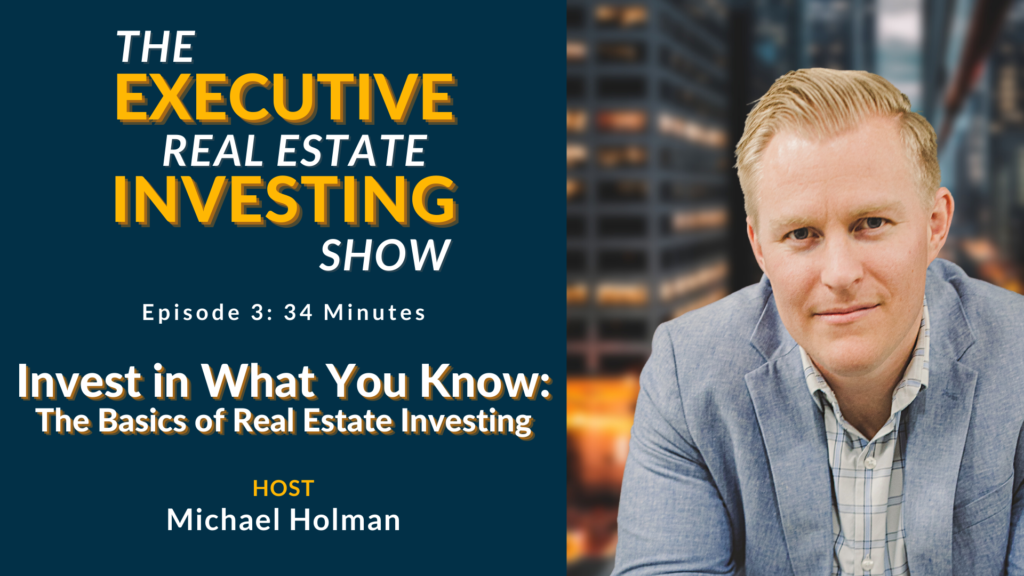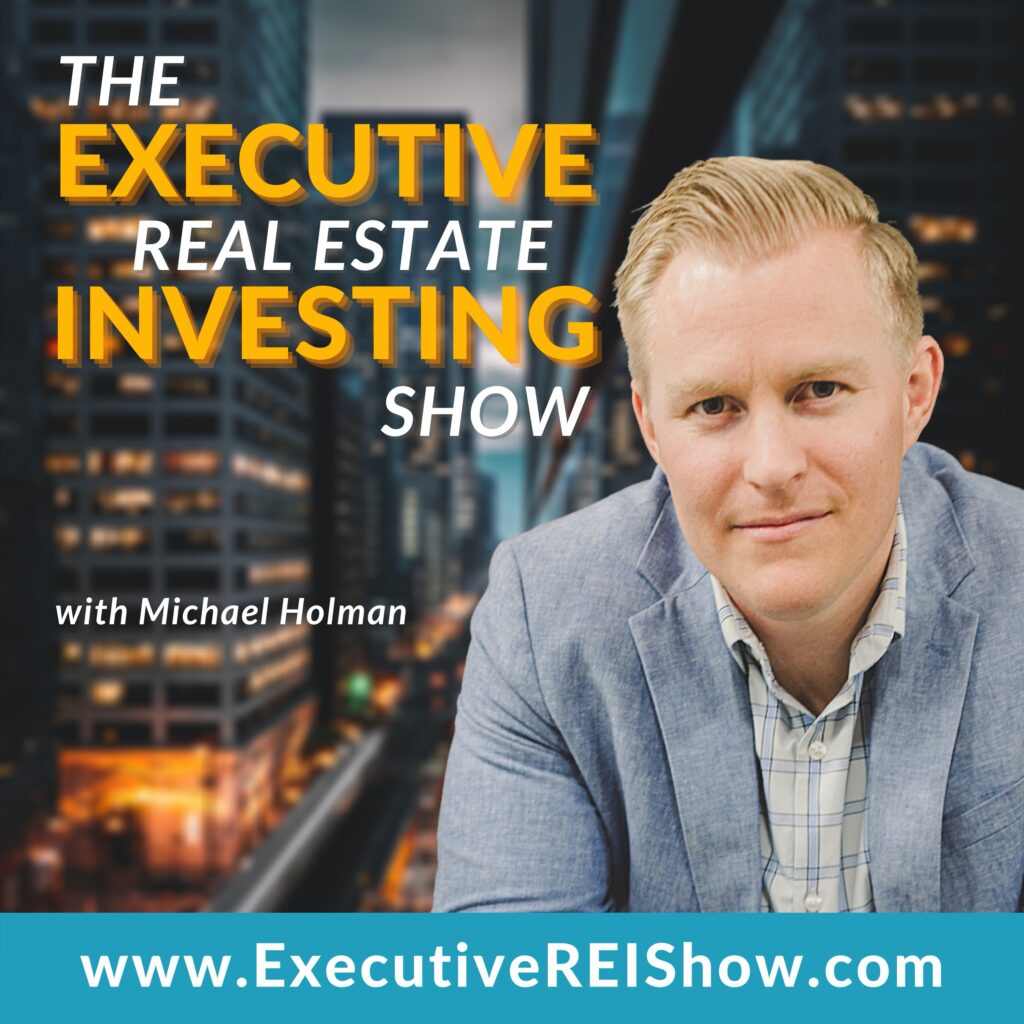
The executive Real estate investing Show
EPISODE 3
Invest in What You Know: The Basics of Real Estate Investing with Michael Holman
- June 21, 2021
EPISODE SUMMARY
This week Michael Holman dives into the advantages of in investing in what you know. Also find out what he considers the gate way advice to real estate investing. Michael gives the pros and cons to the 6 Types of commercial real estate.
- Apartments/Multifamily
- Industrial
- Office
- Retail
- Hospitality
- Specialty
And takes these types of real estate investments further by speaking on the differences and pros and cons of core investments, value-add investments, opportunistic investments and development investments.
EXECUTIVE TIP
Invest In What You Know
It sounds simple, but it’s really important. Investing in what you know gives you a confidence in what you’re doing. It gives you an understanding if things are going well. Invest in what you know, not what you wish you knew, or what everyone tells you that you should know. It’s a big reason why we like to invest in the things that we understand.
Me personally, I’m investing in apartments, self-storage, and medical offices. These are things that I know, and I understand, and we will continue to do it.
LISTEN TO THE PODCAST HERE

The Executive Real Estate Investing Show Podcast
EP 03: Invest in What You Know: The Basics of Real Estate Investing with Michael Holman
Listen on
READ THE TRANSCRIPT HERE
Note: Audio transcription has been automatically transcribed
Welcome to The Executive Real Estate Investing Show. This podcast is for you, the busy business owner or executive looking to create generational wealth. Here, we’re going to show you how to do that through real estate investing from multifamily to industrial and everything in between. You will become a real estate investing expert. And now, here’s your host, Michael Holman.
Welcome everyone to episode three of The Executive Real Estate Investing Show. I am your host, Michael Holman. Excited to be here with you today and excited to begin to know, to learn, to understand real estate investing for all of you busy, busy, busy people out there. I’m talking about you, business owner. I’m talking about you, business executive. I understand how busy you are, and I understand how good you are at your job.
The reason I want you to tune in and listen to the things I have to say, because I am here to help you take all of that hard-earned money and create generational wealth, create a legacy here. That is the goal here. Help yourself, help your family, help your children, help your friends if you feel like helping them. It is time to go to the next level. The ultra-wealthy have more than one income stream coming into them at all times. If you have gotten really good at something, fantastic. Keep doing that, but it’s time to upgrade your investing experience. It’s time to upgrade your investing knowledge and understanding and take things to the next level.
Let’s get right in with the executive tip for today. Today’s executive tip, invest in what you know. Sounds simple, but I’m telling you really, really important here, people. Investing in what you know gives you a confidence in what you’re doing. It gives you an understanding if things are going well, if things are going right. Invest in what you know, not what you wish you knew, not what everyone tells you, you should know. Invest in what you know. It’s a big reason why we like to invest in the things that we understand.
Me personally, I’m investing in apartments. I’m investing in self-storage. I’m investing in medical office. These are things that I know, and I understand, and we will continue to do it time and time and time again. Invest in what you know. That’s the executive tip for today.
Getting right into things, our topic today, we are going to go over the basics of commercial real estate. Really exciting topic because commercial real estate has unlimited potential here. I’m going to get in just in a little bit. I’m going to go into exactly what I mean when I say commercial real estate, because I know some of you right now are thinking, oh, I only like apartments. Well, guess what? Apartments are considered commercial real estate by most standards.
So we are going to get into that and don’t worry. I’ll define that for you, but the basics of commercial real estate. This is going to be fun. Tune in. I wanted to present some avenues to you to begin investing, taking those steps into investing in commercial real estate, and then I want to highlight some of the property types that you might want to consider when you’re getting into commercial real estate, or if you’re already into commercial real estate, I’m going to give you an understanding of what else is out there in the marketplace.
So, big question, right? This is the question I often get as we’re getting started, and I talk to people who maybe have done—a lot of times I’ll talk to these people. They’ve purchased one or two rental properties. They’re sick of cleaning toilets. They sell them. They’re interested in commercial real estate. I get a call from them, and they say, “Mike, I know you do a lot of commercial real estate. What do I do? How do you invest in commercial real estate?”
Just so you know, commercial real estate, a lot of people use CRE interchangeably. If I start using CRE, I mean commercial real estate. So, this is one of the first questions, like I said, that I get when I’m talking to people who are interested in investing in commercial real estate, and they’re really four main ways to invest in CRE.
Number one, you can invest in a real estate security. Number two, you can invest in real estate investment trusts or commonly known as REITs. You can go through online crowdfunding platforms, or number four and my personal favorite, direct real estate investing. But we’re going to get into all of these.
By far, the simplest and easiest way to get into CRE is you simply go onto your computer. You go onto E-Trade or TD Ameritrade or whatever stock brokerage account you use. You simply find a CRE focused, publicly traded stock or ETF and you hit buy. All right, boom. You’re now invested into real estate indirectly.
I want to point out while this does allow you to focus on the broad CRE market, it is important that you’ve only invested in security and not directly in real estate. As such, your returns and your tax benefits, they’re going to be similar to other stocks and not as if you were directly investing in real estate, but it’s a way to get started. If you’re just trying to follow general markets, I’m trying to help you get started whatever way is best for you. I’m telling you right now, directly investing in real estate is the best way, but baby steps.
It’s like, for example, when I first met my wife, she hated sushi. She never really had sushi, but she hated sushi. We got her started on the Vegas Roll. Now, she’s eating everything. I got her eating Samurai Rolls and all sorts of stuff. I call the Vegas Roll the “gateway sushi.” If investing in a real estate publicly traded stock or ETF is your gateway real estate investing device, then do it. But don’t end there. It’s a starting point. It’s not an ending point.
The next, so we’re going to get into, and that’s investing in a real estate investment trust or a REITs. It’s really similar. This is a really similar experience to me, investing in a publicly traded stock or ETF. The exception is a lot of these REITs are private. Some are public, but a lot of private too. Oftentimes, you’re not going to find them on a stock brokerage anywhere.
Returns are generally similar or maybe just a little bit higher than publicly traded real estate securities. But that being said, some REITs have really done very well during certain periods. Just keep in mind though, just like a publicly traded real estate security, you’re missing out on some of the significant benefits, some of the significant returns, some of the significant tax savings. But it is a way to get started if that’s what you’re looking to do.
Third one, the online crowdfunding websites. These are things just like Crowd Street, Real Crowd, Realty Mogul, Equity Multiple. These great sites. They’re fun to look at. The best thing about all these sites is they standardize all the investments. Oftentimes, they accumulate deals from all these other sponsors and then they standardize it. You can go in, and you can look at it, and it’s easy to navigate. They’re giving you the same type of information on the same type of investments, which makes it really easy.
The thing to know is there’s two major issues that you need to be aware of when you’re doing this. Most of these investments are one step removed from the actual investment. What that means is they insert themselves between you and between a direct real estate investment, and because of that, they usually ended up taking a hefty portion of the returns. A real estate investment might make up 15%-20% return, but the online platform keeps 6%, 7%, 8% of that, so you’re only getting a portion of what that direct investment is. This is more common with some sites than others, but it happens.
Number two, the second thing to be aware of. The sites that do let you directly invest in a CRE investment, you have to do your due diligence on those offerings. I personally, I love some of these. We’ve used them. We’ve raised capital through some of these websites as the sponsor. It’s great. We put good investments on there, but I peruse that, and I’ve noticed that there’s some sponsors that are putting what I think are probably their worst deals on there. I don’t know why they do it, but you’re going to have to just be careful and watch for that.
Then other times, they’re pie in the sky, 40% IRR. Dumb things like that. Don’t fall for those traps, right? Just like always, do your due diligence and know that because it’s easy, it’s easy for a reason to find these people.
We’ve talked about three ways to get into commercial real estate investing. I’m going to get into the fourth way, which is the way that I want to focus on. The way that I think you should be investing your hard-earned dollars, and that’s direct real estate investing. This is where you directly invest into a commercial real estate project. It’s not like a security. In this type of transaction, you get all the potential returns. You get all the tax benefits that go into investing in Sierra because you are an actual owner of the project.
Another benefit, you don’t want to pay the middleman in these kinds of relationships, right? It’s you and an investment. Sometimes, you’ll have a sponsor or a syndicator or someone like that. You want to minimize the number of middlemen that you have in these transactions, because they’re just eating away at your profits. You need to have a good team and you need to have someone that you can trust. But if you have a good sponsor that you can trust, there’s no reason to insert another group in the middle of that and go from you to an online platform, to a good sponsor, to an investment. The most, I would say, go from you to a sponsor, to a good investment. Unless you’re just getting started, and you’re looking for a way to kind of get your feet wet, then do what you have to do to get your feet wet. Find yourself a good sponsor and stick with it.
There’s really six types of commercial real estate that you can invest in. There’s a constant argument on what is specifically commercial real estate. I’m going to give you my six and the way that I view it. There might be different opinions, just know that. These six are apartments or multi-family, industrial, office, retail, hospitality, and specialty. Those are the main six that we’re going to talk about.
First things first, getting into apartments. A lot of people like apartments. It’s a really, really common investment for people to get into. Especially if you’re looking to be a passive investor, you’re looking to not be involved in the day-to-day, apartments are really good.
The reason for that, one, just like what I said, investing in what you know. A lot of people know and understand apartments and are comfortable with apartments. Most people in this world have, at one point in their life, rented an apartment. They know it. They understand it. They understand leases. They understand how it works. They understand what it’s like to be a tenant in these apartments. It’s just easier to connect with these investments.
But there’s even more reasons why apartments are beneficial. Lenders really like apartments. They view apartments as less risky than some of the other asset types. Therefore, you can get a higher loan on apartments than you can on some of the other asset types like hotels. Hotels, you might be getting 60%-65% loan value or LTV. Apartments, you’re getting 70%-75%, potentially up to 80% with some lenders. There’s also a benefit of taxes.
So, the tax benefit here is they are depreciated over a shorter, useful life of 27 and a half years instead of 39 years for most commercial properties. That might not be all that exciting, but trust me, depreciation is a beautiful thing. You want it. You want to be able to take advantage of it and being able to do it sooner just simply means you are paying less taxes now, which is something we love about real estate in general and especially commercial real estate.
Now, what you’re thinking is, all right, we’re talking about commercial real estate, and you spent the first three minutes talking about apartments. Well, here’s the reason I’m talking about apartments. By most lenders’ standards, any apartment complex or any multifamily units that has more than four units is considered commercial real estate. All right. That is why we’re lumping it in, and things change when you get to that point. When you’re looking at commercial real estate, lenders are looking at the asset itself and the performance of the asset itself. They’re also looking at you, but they’re looking at the asset and the performance of the asset generally a little bit more than they’re just looking at you and can you make payments every single month?
So, apartments, getting into it. Great product. I highly recommend it. This is my bread and butter. Day in, day out, I do multi-family. We do a lot of different stuff, but I develop multifamily properties and I love it. Great asset. I’d recommend it to anybody.
Next is industrial. Industrial right now is probably the hottest real estate investment on the market. People are going crazy for industrial and it’s for good reason. It’s because industrial has proven to be a very profitable and desirable investment. We do some storage which is considered industrial. So, breaking down the pieces of industrial, because there’s a lot of things that go into industrial. There’s manufacturing, warehouse, distribution, flex space, self-storage—all of those generally fall under the industrial category of commercial real estate.
But like I said, it’s super hot. Usually, warehouse and distribution and some manufacturing that is where the really large institutional real estate investors they’re spending their times on there. I mean, they want to own the facility that Amazon needs, Amazon’s warehouse. They want to build and lease that to Amazon, this $2 million or 2 million square foot facility. That’s where a lot of the big boys are playing. But Flex Space, awesome. Storage, awesome. I love storage. We’re invested in multiple storage properties. I love it. it’s a great asset.
We’ll get into this more, but the only thing was storage, watch out for over-saturation cause it’s happening right now. Be aware of that. But industrial, super hot. It’s not the sexiest. Let’s be honest, right? I mean, you think about investing in some super nice Class A office or a hotel, but industrial’s not that sexy, but you know what? It is super hot right now. Great asset. Do your due diligence. Do your understanding, but industrial is a great place to be playing right now.
Next, we’re onto office buildings. A lot of different classes of office. I’m going to talk about offices just generally, but these are really popular among some of the institutional investors. It’s kind of like a Marquis investment. Everybody wants their name on one of the big office buildings, and if you own the office building, it’s easier to put your name on that office building.
Office buildings are really categorized in four different ways, and I’m going to walk you through these so you can understand it. If you’re interested in investing in office, these are phrases and terms you’re going to want to understand. The first way it’s categorized is by quality of space. That’s Class A, Class B, Class C. This is a really common thread throughout all of real estate. You hear this in apartments as well. Class A apartments, Class B apartments, Class C apartments. Generally, Class A apartments are your nicest. That’s like with any real estate. Class B, you’re sitting middle of the road. Class C are your fixer uppers or dogs or things like that. Just be aware, you can make a lot of money off of Class B. So. don’t rule those out. But just be aware of what they are.
Next is by height. High-rise, mid-rise, low-rise, these are terms you’re going to hear. The next way that offices are categorized is by use. There’s general use. There’s medical office. There’s research and development. There’s all these different uses and then last by location, so urban offices, suburban offices. I know where I live currently, that’s kind of getting mixed almost. There’s a big downtown, but a lot of people are moving out of downtown and into these what used to be suburban areas, and they’re kind of these urban suburban areas. But those are the four categories, so the quality, the height, the use, and the location.
Offices can potentially be a great asset. I know what everyone’s thinking right now. If you’re listening to this live, you’re saying, “Well, Michael, I thought COVID decimated offices. I was working at an office for 20 years and then COVID hit, and I am now working from home with no end in sight, or even my company told me that I can work from home for as long as I want.” I understand that.
I have a couple of points that one, I don’t think offices are ever going away completely because there’s crazy people like me who love coming into the office every single day. Number two, the type of office is very important in there. Look at medical office. Even though they’re trying to do everything they can with Telehealth and things like that, at some point you have to go into your doctor’s office.
Have you ever tried having a dentist appointment and getting a crown virtually? It doesn’t work, right? You have to go into an office. So, there’s these different kinds of offices. The office landscape may be changing a little bit. There may be a little bit of fluctuation there over the next a little bit, but it’s not going away completely, and it’s important to understand that.
Next is retail, right? Retail has seen a big shift. I personally have a bunch of retail across the Midwest. I’m invested in Family Dollars in Colorado, Wyoming, South Dakota, Montana. I have these single net lease, Family Dollar, Dollar Tree, Big Lots, things like that currently all across the Midwest, and I really like a lot of them for a lot of different reasons. But retail is changing, and it’s important to understand that.
It felt like back in the day, if you just built a retail site, no matter what it is, there was somebody who was filling it. But you have these different factors that are coming in that make it—you should have to be more intentional about investing in retail because online retail is becoming really big. I mean, Amazon. This Amazon effect.
You hear a lot about pre-COVID. I was hearing a lot what people were calling the “retail apocalypse.” Retail is going down and retail is going down. I don’t think retail is ending, but I think you have to be intentional with retail. You have to understand what you’re doing. I think people are going to have to get more sophisticated with retail than they may have been in the past. A lot of times, the first-time investors would just end up buying retail. They think it’s great, and they put a lease on for five years and then COVID hits and then people aren’t paying, and they don’t know what to do.
I just think that retail in general, the people who are going to thrive there are those who are willing to be the most sophisticated and the most calculated in what they do and how they invest in that retail. But retail is a big one. This range is a lot. I mean, this can cover a lot of different things, but the general idea is when you’re building a building that someone’s going to go in there for some retail purpose. A retailer is occupying that space, a Family Dollar, Dollar Tree Walgreens, CVS, O’Reilly Auto Parts, your local hairstylist, or barber shop, or I don’t know. I don’t know why I keep thinking battery shop for some reason. For some reason, I keep wanting to say battery shop, but yes, if your local battery shop wants to become a lease space that is as a retail investment. That’s retail in general. Like I said, my overall feelings, you need to be somewhat sophisticated in your approach to investing in retail.
Next, hospitality. Hotels, the big rise of Airbnb. I’d put that in this category. Fun space to be in. We’ve done some retails. We did a residence in downtown a while back. We have another one slated in the books. We’ll see how that happens with all this COVID stuff. But hospitality in general is a fun space to be in. There’s some important things to know with hospitality. It’s generally viewed as more risky. COVID is a perfect example, and it doesn’t have to be COVID. It could be anything, but when markets tend to go down, hospitality seems to be one of the first ones to hurt and one of the worst ones to get hurt.
On the flip side, in good times, hospitality tends to make more money than just about anyone. But because of that, the big key with hospitality is it generally takes more capital to do hospitality. Lenders in general, just aren’t going to be willing to lend you as much money on a hotel. You might get 60% of the cost funded, 65% I would say max. Any more than that, and you’re probably using a really expensive lender. Hotels are really management intensive. It’s something to understand. Most people get operators.
The other thing that I’ll throw into this mix, which it has become really popular over the last little bit is Airbnb. I would honestly put Airbnb in this space. I mean, if you’re an investor that owned a lot of Airbnb’s, I know some people that have a bunch of Airbnb’s, and they love them. One of our current investors he has like 75, 80 Airbnb’s in this resort location in Southern Utah. Fantastic. I mean, he’s made a great business off. I would definitely put Airbnb and owning Airbnb properties under hospitality. There’s some benefits to that, and we’ll have to make an entire episode later on, on Airbnb because there could be a lot that we could say regarding that, but in general, Airbnb, I’d put that in our hospitality. Some might strongly disagree with me, but you know what? We’re going to put it in there because the idea is still the same.
Lastly, we’re going to get into these specialty properties, special commercial real estate. This is basically just a way to say anything else, except what we’ve talked about. Theme parks, golf courses, marinas, churches, things like that. This all falls under specialty. Some of these properties can be really great investments. Generally, I don’t recommend them.
If you’re just getting started though. I mean, we’ve done a golf course. We developed a golf course, fantastic golf course. It’s really hard. I don’t know why we made it so hard to be honest. Maybe it’s just that I’m a bad golfer, but we’ve done a golf course. Really fun. Just cool to tell people you built the golf course. Didn’t make a lot of money though. We ended up selling it to the city after a little while because it didn’t make any money. Hard to keep hard to keep a golf course that doesn’t make any money. The good news is we built some apartments right next to us. Those did really well, but golf course itself, not so hot.
But in these specialist properties, you usually have these companies that specialize in things like this. I mean, you’ll have people that’ll specialize in churches. You’ll have people that’ll specialize in golf courses. Just so you know, most people never buy or develop a golf course for the golf course. They develop a golf course for all the real estate surrounding that golf course because it just got infinitely more expensive. But theme parks, I mean, these are very specialized groups that are usually doing this. In general, I don’t recommend spending much time in here, and I’m not going to spend much time here either.
Getting on to, as we wrap up some of these things, last thing I want to say is there’s really four main categories of commercial real estate. That’s core, value add, opportunistic and development.
Core investments. Core investments are generally the least risky and let me back up for just a second. All four of these investment types can go under the asset type. Under a multifamily, you can have core, value add, opportunistic, and development. Under office, you can have core, value add, opportunistic, and development. Think of this as a subset, but this relates to where the property is currently at and how it’s currently performing.
So, core investments, they’re the least risky. These projects are usually stabilized. They’re fully leased. They’re cash flowing properties. These are going to be your smallest returns. These returns oftentimes range from, I would say around 7%, 6% or 7% to 15%. I mean, this is something like a newly built apartment project that fully rented, Class A, good management in place, charging market rates. That’s a core investment, a core property.
Value add investments. Value-add investments or value-add properties are generally properties that do have some sort of cashflow, but there’s opportunities to increase that cashflow over time. The most common ways that people will increase this cash flow is going to be through like property improvements, so capital improvements. Putting a new roof on or putting stainless steel appliances in or something like that, repositioning the property.
Maybe you’re an office that traditionally has been professional. Maybe you reposition it into a medical home. That’s definitely a big value add play or improving management operations. So that once again, property or capital improvements, repositioning the asset, or getting better management involved.
These are very common CRE investments. Returns usually range between 11% to 17%. Sometimes people were getting those up to 20%. An example of this. If you had, let’s say, a 20-year-old apartment complex, right? It’s like three fourths the way rented. Maybe it’s falling apart or probably not falling apart, but it shows that it’s 20 years.
You come in. You do some capital improvement. Maybe you put new countertops, new flooring. You put new stainless-steel appliances in, and all of a sudden, you’re able to charge a hundred dollars more for that same unit. That’s a value add there. You’re trying to increase the value. You’re trying to add value through your efforts in the project.
Next opportunistic investment. Opportunistic investors. Very similar to value add, but they’re generally considered a step up and risk. So, these properties need significant rehab or they’re just like completely vacant properties. Your returns are generally a couple percentage points higher than value add. Oftentimes, these are getting 13%, 14% up to 20, 21% things like that. Example of this, this is like if you were to build or buy an apartment project and it was 30, 40 years old, falling apart. Maybe part of it was in a fire. It’s like a quarter of the way rented well below market rates, right? This is an opportunistic investment.
Lastly, development investments. Some people are going to classify development under opportunistic. I understand why. I don’t blame them. I personally like to separate the two because I think there’s enough differences and enough nuances that it’s really important to separate those being really good opportunistic deals such as you’re great at taking a rundown piece of garbage apartment complex and making it really good. That is not the same process and project as development. That’s why I separate the two. So, this is an investment that goes from raw land into a fully built project. Usually, we go all the way to stabilization because that’s where you’re getting the most value.
So, development investments definitely have the most risk of all four of the investments. That being said, they also enjoy the most potential return. It’s not uncommon to see development investments that are going 18 to 20 plus percent annual returns, and I’m talking internal rate of return right now. IRR annual rates oftentimes are low. To even high twenties on these investments, right?
So, your example of this, you’re taking a piece of property you own. You buy seven acres. You’re going to put 150 units on it. You’re going to build it. You’re going to stabilize it. That is a development investment.
So, let me tell you the reason why I like in-depth development investments and all investments are good, but I spend most of my time in development. The reason I like it is because you’re able to add so much value, right? A value add, you do add value. Don’t get me wrong.
But for example, I mean, we’re building a project right now. We’re developing a project. It’s about to start construction. it’s going to cost me all in $58 million to build. I just got the appraisal back in the high 70 millions. That’s roughly going to be $20 million and that’s from the time it’s built. Like I finished it, and it’s just there. It’s just $20 million creative, a thin air. Poof. That’s why I like development, but I do, do value add, I do, do opportunistic and I do, do core. I do all three of those things. In addition, development, just where I personally like to play. That’s the sandbox I enjoy the most.
I hope that today’s episode, you learned the basics of commercial real estate. We didn’t go too far into depth in any of these things, but I want you to have a basic understanding. When you’re thinking about getting into commercial real estate investing, when you’re thinking about purchasing a property, I want you to have a clear understanding of what you’re doing. Invest in what you know. That is why we’re doing this podcast. That’s why we’re doing these shows. The reason we’re doing this is so that you can learn and understand and move forward to create your generational wealth.
That is the end of the show. Thank you, and we’ll catch you next time on The Executive Real Estate Investing Show. Thank you for listening to the executive real estate investing show. Ready to learn more? Go to ExecutiveREIShow.com for more episodes and resources to help you create generational wealth through real estate investing.
Thank you for listening to The Executive Real Estate Investing Show. Ready to learn more? Go to ExecutiveREIShow.com for more episodes and resources to help you create generational wealth through real estate investing. That’s ExecutiveREIShow.com.







